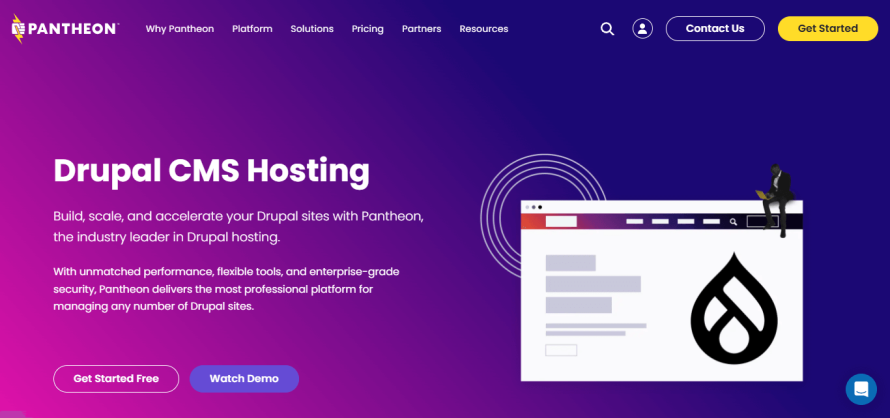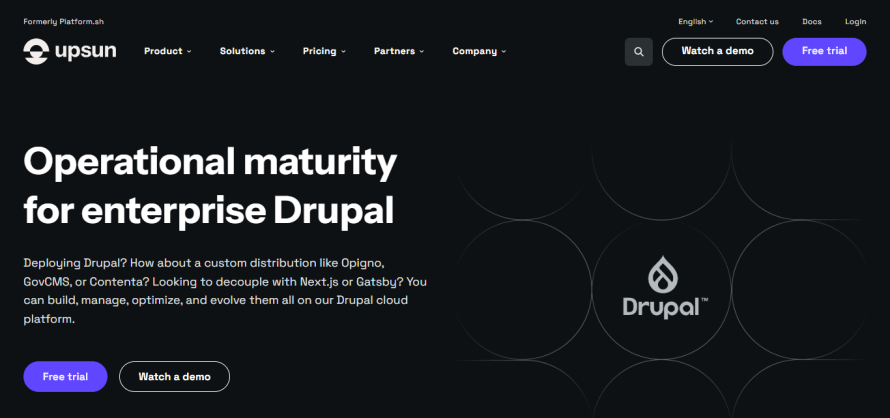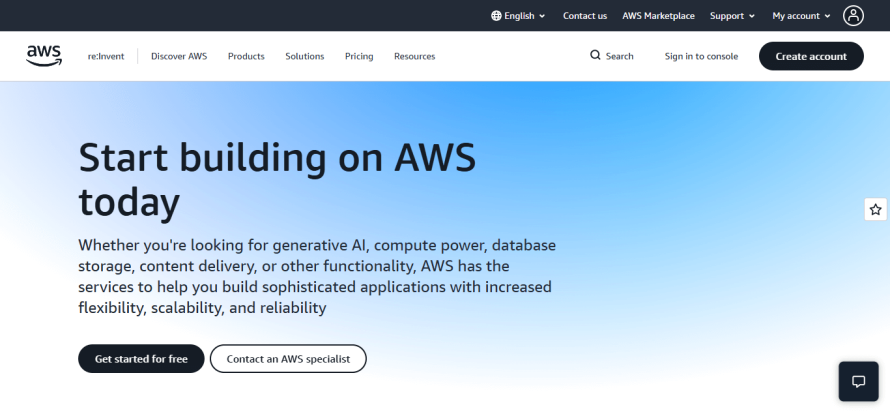The Real Cost of Drupal Hosting Compared Across Major Providers
Choosing the right Drupal hosting provider is one of the most strategic decisions digital teams can make. Yet, when it comes to comparing providers, the conversation often fixates on sticker price. The reality is that the cost is more complex. Total cost of ownership (TCO) for Drupal hosting includes far more than just monthly fees. You also have to consider developer productivity, infrastructure elasticity, support quality, security capabilities and how well the platform aligns with your team's workflows.
In this post, we take a closer look at several major Drupal hosting providers so you know what you’re actually getting for your money.
Top Drupal hosting providers overview
Pantheon
Image

Pantheon is a WebOps platform built from the ground up to support modern website operations. Its key strength lies in combining developer agility with operational stability. Unlike traditional hosting, Pantheon provides pre-configured Dev, Test, Live environments out of the box, complete with Git-based version control, automatic backups and integrated performance tooling.
For teams that prioritize speed of iteration, DevOps automation and uptime under pressure, Pantheon offers an end-to-end workflow that reduces time-to-launch and long-term maintenance overhead. It’s particularly well-suited to digital agencies and in-house teams managing multiple sites, especially where developer productivity and reliability at scale are critical.
Acquia
Image

Acquia has deep roots in the enterprise Drupal ecosystem. Its platform offers robust tools for large-scale content management, compliance-heavy industries and complex governance structures. Features like Acquia Cloud IDE, Site Factory and extensive support contracts make it appealing for organizations with strict editorial workflows and enterprise procurement processes.
However, Acquia often comes with longer onboarding timelines and more rigid deployment pipelines. It excels when enterprise-grade support and control are top priorities, but can feel heavyweight for agile teams or projects without extensive infrastructure needs.
Upsun (formerly Platform.sh)
Image

Upsun positions itself as a platform-as-a-service (PaaS) for development teams who want full-stack control. It’s built around Git-based workflows, enabling developers to clone entire environments – including infrastructure – to test features or fixes in isolation. This model supports advanced DevOps practices and makes it easy to maintain parity between environments.
That said, Upsun assumes a high level of developer sophistication. For teams with experienced engineers and custom infrastructure requirements, it’s a powerful option. For teams seeking simplicity and opinionated workflows, the learning curve can be steep.
Amazon Web Services (AWS)
Image

AWS is the ultimate blank canvas. With EC2, RDS and dozens of complementary services, you can architect a custom Drupal hosting solution with full control over networking, security, scaling and monitoring. This is ideal for organizations with dedicated DevOps resources and highly specialized requirements – think governments, media companies or large SaaS platforms.
But with great flexibility comes complexity. Running Drupal on AWS isn’t a hosting solution – it’s a hosting project. You’re responsible for configuration, deployment, scaling, patching and securing your infrastructure. While AWS can be highly cost-effective at scale, it demands continuous management and operational maturity.
Traditional managed hosting
Shared hosting providers like SiteGround and Bluehost represent the more traditional end of the spectrum. While these platforms are officially recommended by WordPress.org and offer extensive WordPress optimizations, they also support Drupal installations. They provide user-friendly dashboards, affordable pricing and decent general-purpose performance. For personal sites, small nonprofits or teams just getting started with Drupal, these providers can be a reasonable short-term choice.
However, these hosts typically lack Drupal-specific optimizations and the scalability required for high-traffic or complex use cases. Even if the VPS and cloud hosting plans offer more resources and control than the shared hosting plans, they still lack the integrated CI/CD pipelines, configuration management and developer workflows expected in professional Drupal environments. When your site outgrows basic requirements – be it performance, security or development workflow – these platforms can become a bottleneck rather than a foundation.
Each of these providers brings a different philosophy to Drupal hosting. That’s why, in the following sections, we’ll break down how they compare across the dimensions that matter most: ease of use, performance, security, cost, support and ultimately, fit for your team’s goals.
Ease of use
Pantheon stands out for how intentionally it’s built around developer workflows and team collaboration. This level of structure allows developers to focus on building and shipping features, while giving non-technical users a clean interface for managing releases and updates. It strikes a balance between control and simplicity that few other platforms manage to achieve.
Acquia, by contrast, takes a more enterprise-focused approach to usability. It offers a suite of powerful tools, but these tools come with a learning curve and assume more formalized team roles and processes. For large organizations with clear governance models and complex approval flows, Acquia provides the necessary structure. But for smaller or more agile teams, the added complexity can slow things down unless there’s dedicated engineering or IT support to manage the platform effectively.
More technical platforms like Upsun or AWS offer extensive flexibility, but at the cost of steep setup requirements and daily operational involvement. And while traditional managed hosts offer a more familiar cPanel-style interface, they lack the modern development workflows and automation that most Drupal teams expect today.
The verdict: If you value fast onboarding, intuitive tooling and developer-friendly workflows, Pantheon leads the pack. It hits the sweet spot between automation and control, making it ideal for teams who want to spend less time on infrastructure and more time delivering value.
Speed, scale and stability under load
Any platform can serve a page under light traffic – but sustained performance under pressure requires optimized architecture, intelligent caching and elastic scaling.
Pantheon is engineered for this kind of resilience. Its container-based infrastructure, global CDN (via Fastly) and Drupal-aware caching layers (including edge, page and object caches) provide fast, consistent delivery – even under high load. Pantheon’s scaling is horizontal and automatic, requiring no manual provisioning. For busy editorial teams, major launches or sudden campaign surges, this kind of out-of-the-box stability is a major advantage.
Acquia, with its enterprise-grade infrastructure, also performs well at scale – particularly for clients who’ve invested in fine-tuning their application architecture. Its support for high-availability clusters, content delivery via Akamai or Cloudflare and proactive monitoring through Acquia’s support team can deliver strong performance under load. However, optimal performance often depends on how well the environment is configured. In many cases, organizations require hands-on support or internal DevOps expertise to unlock the platform’s full capabilities.
Upsun allows highly granular control over resources and its performance can be impressive when environments are well-tuned. But that tuning often requires deep familiarity with both the infrastructure and the codebase, making it better suited to teams with in-house engineering.
AWS, as expected, offers nearly unlimited scalability – but only for those who can architect it correctly. The raw tools are all there – load balancers, autoscaling groups, global infrastructure – but performance and stability depend entirely on your team's ability to configure and maintain those components. Without ongoing optimization, performance can become inconsistent.
Meanwhile, traditional shared hosting platforms tend to show strain under traffic. Limited resources, shared infrastructure and lack of built-in Drupal optimization mean sites are more vulnerable to slowdowns or crashes when demand spikes. They're suitable for low-traffic or hobbyist sites – not production-grade Drupal applications.
The verdict:
- Pantheon offers scalable, high-performance Drupal hosting right out of the box, with no special tuning or DevOps intervention required.
- Acquia can also scale reliably – but often needs custom configurations and support.
- AWS and Upsun offer power, but only if you have the team to unlock it.
From basic security protection to enterprise compliance
Pantheon takes a strong position here, embedding security directly into the platform’s core infrastructure. HTTPS is enforced by default. Web application firewall (WAF) protection is available via Fastly integration. Regular platform-level updates are handled automatically, reducing the operational burden on developers. And for enterprise clients, Pantheon supports SOC 2 and GDPR compliance – ensuring that teams with regulatory obligations have a solid foundation.
What stands out about Pantheon’s approach is that security isn’t something you have to manually configure or bolt on – it’s built into every environment. Developers don’t need to worry about patching servers or configuring CDNs for DDoS protection. And since all users deploy through Git-based version control, there’s a clear audit trail of every change.
Acquia also delivers robust security features – particularly suited for large organizations with high compliance requirements. Acquia's enterprise offerings include FedRAMP authorization, advanced access controls and dedicated security operations support. It’s a strong choice for government, healthcare and other sectors where certifications and risk frameworks are required. However, taking full advantage of these features often involves purchasing specific tiers or services and may require more direct involvement from Acquia’s customer success and engineering teams.
On more technical or infrastructure-centric platforms like AWS, security is entirely in your hands. You can architect an airtight system, but only if you have the expertise to manage VPCs, IAM roles, patch cycles, key management and compliance documentation. AWS offers all the pieces, but assembling and maintaining them is a continuous responsibility.
The verdict:
- Pantheon delivers robust, built-in security and compliance features without requiring users to be security experts.
- Acquia is strong for enterprise compliance, especially in regulated industries, but it may involve more cost and complexity.
- AWS is powerful, but places the full burden of security on the customer.
How does the cost compare between hosts?
At first glance, comparing the cost of Drupal hosting seems simple – monthly or annual pricing tiers, bandwidth limits, storage, etc. But in reality, the sticker price is only one part of the equation. When you factor in developer time, third-party tools, security add-ons, infrastructure maintenance and downtime risk, the total cost of ownership (TCO) looks very different across providers.
Pantheon offers transparent, value-based pricing that includes much of what other providers charge extra for: automated backups, staging environments, integrated CDN, version control, caching and security features. Teams get enterprise-grade infrastructure without needing to build or manage it themselves – saving hours of developer time per week. For agencies or organizations running multiple Drupal sites, Pantheon’s multi-site management and workflow tools can drive significant operational efficiency, especially at scale.
Acquia tends to operate at a higher price point, particularly for enterprise customers. While it provides strong compliance and support features, many capabilities (e.g., high availability, support SLAs, developer tools) are gated behind premium tiers or add-on services. For large organizations with specific security or governance needs, that cost may be justified. But for mid-sized teams or budget-conscious organizations, Acquia’s TCO can escalate quickly.
AWS, by design, charges based on usage, not features. This can be economical at first, but unpredictable over time. Most teams underestimate how much manual configuration and ongoing maintenance are required. Between EC2 instances, RDS, storage, load balancers and monitoring, costs can spiral – especially if infrastructure isn’t optimized. Plus, labor costs go up when you need DevOps expertise just to manage your hosting.
Upsun typically sits in the mid-to-premium range. It offers good value for developer-centric teams who can fully leverage its GitOps workflows and environment cloning. But for less technical teams, underutilized features can make the platform feel expensive relative to its actual business impact.
Traditional hosts like Bluehost or SiteGround advertise low-cost plans, but these often lack the performance, tooling and support necessary for modern Drupal applications. Once you factor in third-party add-ons, external backups, developer workarounds and downtime risks, the “cheap” option can quickly become costly, especially when projects grow or require more reliability.
The verdict: Pantheon delivers the best balance of price and performance, bundling key features that reduce total cost of ownership, especially for teams running multiple sites or working at scale. Also, for large organizations with specific security/compliance needs, Acquia's TCO may be more predictable than platforms with automatic usage-based upgrades.
How the different hosts compare for support
Pantheon offers Drupal-specific support (as well as WordPress) that's deeply integrated with the platform itself. For all users, there's access to detailed documentation, automated diagnostics and live chat with real engineers – not just generalists reading from scripts. On higher tiers, teams benefit from priority support, performance audits and proactive recommendations. What makes Pantheon’s support model stand out is how closely it’s tied to the platform’s architecture. The support team has deep visibility into site behavior and logs, making troubleshooting faster and more accurate.
Acquia also delivers strong, enterprise-grade support, particularly for organizations that require SLAs, compliance-aligned escalation paths and 24/7 global coverage. Its team has deep Drupal expertise and offers strategic assistance as part of higher-tier service packages. However, access to those premium support levels often comes at significant additional cost and some teams report that responsiveness varies depending on contract level and account size.
On AWS, support quality depends entirely on your plan. Basic plans offer limited support, primarily through documentation and forums. For direct assistance, you’ll need to purchase a premium support plan, which can get expensive. Even then, AWS support is not Drupal-specific – meaning you’re often left bridging the gap between infrastructure-level issues and application-level troubleshooting on your own.
Upsun provides responsive support with strong developer knowledge, especially for infrastructure and deployment questions. However, some users report that issue resolution for Drupal-specific challenges can be slower or require escalation. Their support model is tuned for technically advanced teams that can handle most issues internally and only escalate when necessary.
Traditional hosts offer entry-level support that’s fine for generic web hosting issues, but lacks the depth or specialization needed for serious Drupal development. Most agents aren’t equipped to handle CMS-specific debugging and escalations are often slow or require external consultants.
The verdict: Pantheon offers fast, Drupal-savvy support that’s tightly integrated with its platform, enabling quick resolutions and proactive guidance. Acquia also provides excellent support, especially for large enterprises, but often at a premium.
Which platform fits your needs?
Your team’s size, skill level, security needs and development velocity all shape what “the best Drupal hosting” really means for you.
Here’s how the landscape shapes up across different types of teams:
- For high-performing digital teams that value DevOps automation, speed to launch and reliability at scale, Pantheon checks all the boxes. It offers a structured, Drupal-native workflow without requiring DevOps expertise. Teams get world-class performance, built-in CI/CD practices and fast, knowledgeable support – right out of the box.
- For large enterprises with highly specific compliance, governance or procurement requirements, Acquia provides the certifications and support structures necessary to meet complex stakeholder needs. That said, teams should be prepared for longer onboarding, higher cost and more operational overhead.
- For developer-heavy teams that want full control over infrastructure and workflows, Upsun is a strong fit – especially when internal resources can manage infrastructure as code. But for those without strong DevOps, the learning curve can be a blocker.
- For organizations with in-house DevOps resources, AWS provides ultimate flexibility. But with that control comes full responsibility: cost tracking, patching, monitoring and securing every layer of the stack. It’s not hosting – it’s infrastructure.
- For small sites or budgets, traditional hosts may offer a starting point – but rarely a sustainable one. As needs grow, so do the limitations.
What becomes clear is that as your complexity increases – whether it's traffic, team size or compliance requirements – platform matters more. So, if you want a platform that accelerates development, simplifies operations and scales with your organization – without requiring a DevOps team to babysit it – Pantheon is the clear winner. It’s built for modern web teams who need speed, reliability and results.
Try Pantheon today!
Drupal is powerful, but it’s only as effective as the platform it runs on.
Over the course of this comparison, we’ve looked beyond surface-level pricing to understand the real cost of Drupal hosting, factoring in performance, developer productivity, operational complexity and support. And across every dimension that matters, Pantheon emerges as the platform built for modern Drupal teams.
Other providers may offer raw infrastructure or legacy support models, but Pantheon gives you a performance-optimized, workflow-driven, secure foundation that empowers your entire team to move faster and build better. No servers to patch, no custom pipelines to maintain, no surprises when traffic surges.
If you're serious about building high-performing, scalable Drupal sites, try Pantheon for yourself today!